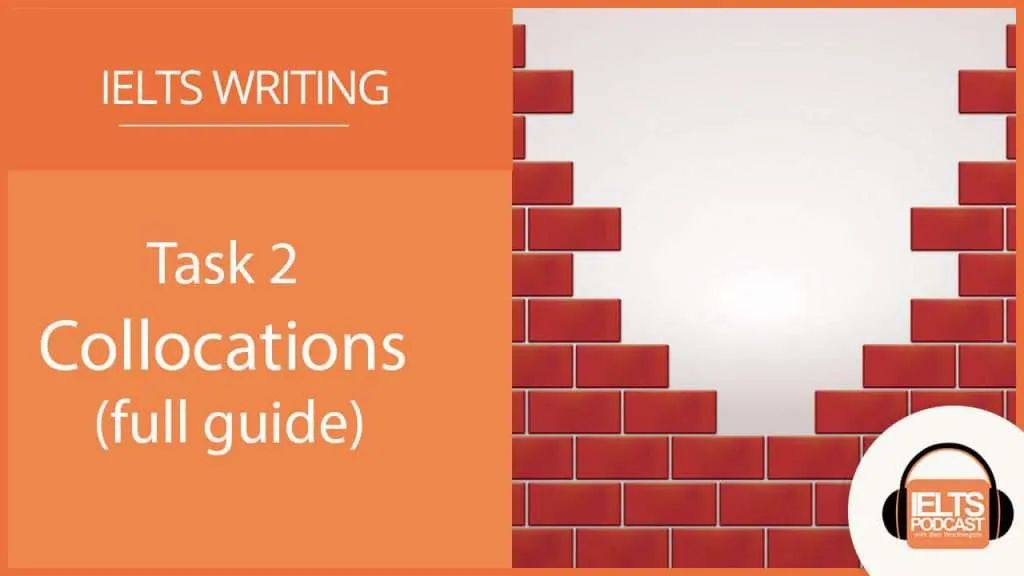
Academic Collocations for Task 2
Home » IELTS academic task 2 » Academic Collocations for Task 2
Collocations are important for both writing and speaking.
When you use collocations in your spoken English your language will flow.
Because when you start a collocation the listener is already expecting the next part of the phrase.
For example, I start speaking about fast food, you’re expecting the word “restaurant” after I say fast food.
Because the listener expects the other half of the collocation they don’t have to pay as much attention to it.
This principle works exactly the same with academic writing. It makes the writing flow much easier.
The six different collocations
- Adjective/ noun - an illegal product or a counterfeit product
- Adverb/ adjective - technically impossible
- Noun/ noun - Night shift Example: I’m going to work the nightshift in the factory.
- Verb/noun - Take an exam/ fail an exam/ prepare for an exam
- Adverb/ verb - Regularly comment or ease tension
- Slightly longer phrases with a combination of words - Make a contribution to the charity.
Four ways to use collocations
There are four ways to use collocations that can help you to improve your English. 1. Find new meanings and uses for the words that we have already learntThis is a very efficient way of improving your vocabulary because you’re not actually learning new words, you’re just learning new uses for the words.
You’re employing the same words but in different cases. For example, maybe you learned the word harbour.
A harbour is a sheltered area of water where ships come to load, offload or to park for a while.
We can also use the word harbour as a verb meaning to provide shelter. So, we can write “It is a crime to harbour a fugitive from the law.”
Here’s another example of using the word harbour: We should not harbour negative feelings.You could say Ben harbours a grudge against his business partner.
It basically means to keep negative feeling inside.Another good example is distribution.
As a noun distribution means to give out, spread or supply something to various people.
We could, for example, say that the channel tunnel between England and France has improved the distribution of goods between Britain and Europe. You can also use it as a verb, useful for academic task one - you could say that the map shows the global distribution of the population.
If you want a very practical trip you can go to the Cambridge online dictionary. Some words have a C1, C2 or B1 next to the word.
C2 Roughly equates to Band 9, C1 to Band 8, etc.
Here is more information of the equivalency between CEFR and IELTS Band scores.
Use collocations to avoid mistakes
When you use a collocation you can’t make a poor choice of words.
For example, it is far better to use the words “domestic tourism” than “home tourism”.
The listener can understand what you mean by the second phrase, however, the first sounds more professional.
By learning the correct collocations, you can avoid mistakes that make it more difficult for the native English speaker to a understand you.
More precision with your written English
For example: “There is no doubt that test preparation has an impact on our spending.”
If I add the word significant before the “impact” I emphasise the impact and make the sentence more precise.
“There is no doubt that test preparation has a significant impact on our spending.”
More precision with your spoken English
The other advantage of using collocations especially if you struggle with speaking is that if we learn the collocation, we can push the grammar rule to the back.It helps to sound more natural if you learn the whole collocation.
One of the collocations could be adverb/ adjective so I can say “It is ridiculously easy to IELTS with the online course and most students are highly successful.”
Just learning the phrases makes it easy to pick them up when you want to create sentences.They are useful for formal speech, informal speech, and academic papers also.
The Academic Word List (AWL)
This was a product of a research document where they put in various academic research papers into a computer and then extracted the most common words used in the papers. You can find it at Victoria.ac.nz or just find academic word listing through Google.
It’s separated into the most common ones and you’ll find, not surprisingly that “distribution” is in the top 20.
Audio tutorial
You can download or listen to the audio version of the collocation lesson here:
Direct Download Here | Stitcher | iTunes | Spotify | Soundcloud | Transcript
Tutorials and Tips to Prepare for Task 2
- How to Get Ideas for Task 2
- Extremely Useful Sentences for Task 2
- Five Powerful Sentence Structures to use in your IELTS Writing test
- How to use comparisons in Task 2
- Concession Paragraphs for “do I agree/disagree essays”
- How to write an IELTS Essay Conclusion
- IELTS Cohesion and Coherence
- 3 ways to paraphrase for your Task 2 introduction
- Marking Criteria for IELTS Writing
- Topics Sentences for Your Essays
- 7 Ways to Improve your Sentences in Your IELTS Essays
- Grammar for IELTS Writing
- Academic Collocations for Task 2
